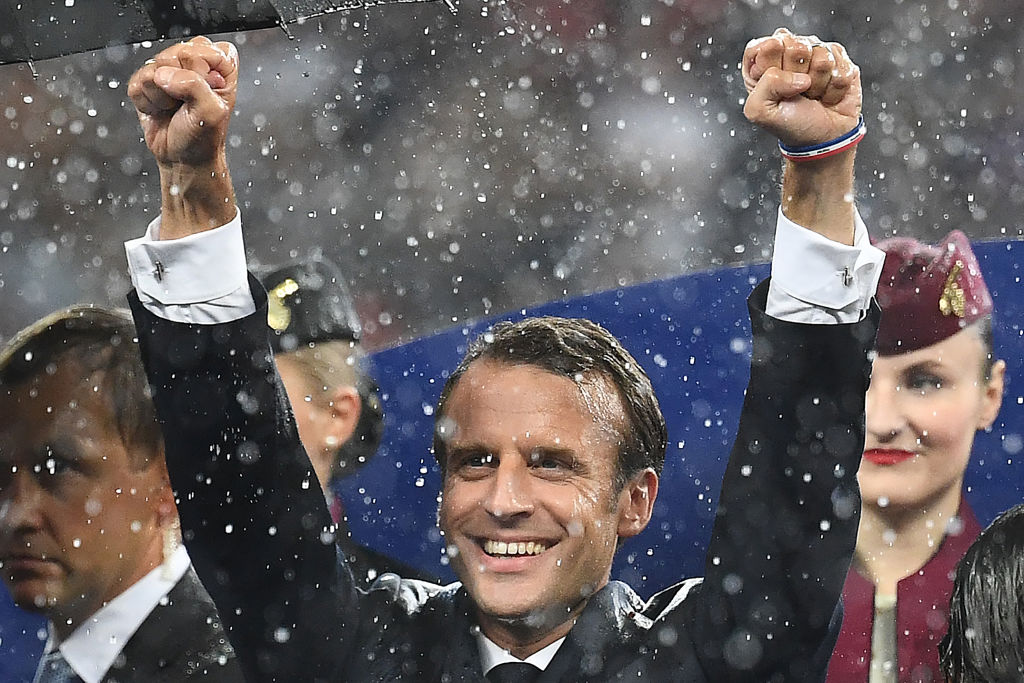France has adopted a different approach to the World Cup in Qatar than most of its European rivals. While the likes of England, Denmark and Germany will virtue signal their disapproval of the Gulf State’s views on various issues, France is set to remain silent.
Their captain, Hugo Lloris, the Tottenham goalkeeper, has said he won’t be joining other European skippers in donning an anti-discrimination armband during the tournament. ‘When we are in France, when we welcome foreigners, we often want them to follow our rules, to respect our culture, and I will do the same when I go to Qatar,’ explained Lloris. ‘I can agree or disagree with their ideas, but I have to show respect.’ It was a declaration that echoed that of Noël Le Graët, the president of the French Football Federation.
Are they their words, or those of their president? Emmanuel Macron is the unofficial cheerleader for Les Bleus, rarely missing an opportunity to show his support for the reigning world champions. When France beat Croatia in Moscow in 2018 to win the World Cup, Macron made sure his rapturous celebration was captured by a photographer, and he’s cultivated a particular friendship with the team’s star player, Kylian Mbappé, inviting him to the Elysée in 2018, along with George Weah, the president of Liberia, to discuss how football might boost economic development in Africa.
On a trip to Bangkok for the Asia-Pacific Economic Cooperation forum. Macron was asked on Thursday what he thought of Qatar hosting the World Cup. ‘These questions must be addressed when hosting the event is decided,’ he replied, adding that it is ‘a very bad idea to politicise sport’. He also underlined the strong relationship between the two countries, which he described as ‘frank, friendly and constructive’.
Macron is being consistent in this regard. In December 2021 he said France would not join Britain, Canada, America and Australia in a diplomatic boycott of February’s Winter Olympics in Beijing because it would be ‘very small and symbolic’. Macron did suggest that France could participate in an EU boycott but such a move never materialised, despite the fact that France had the rotating presidency of the EU Council in the first six months of this year. Instead it was left to individual EU states to boycott the games, which several did, notably Germany, Portugal, Belgium, Denmark and the Netherlands.
It was never likely that Macron would speak out against Qatar’s hosting of the tournament because to do so would be politically awkward. It is France, after all, which is, according to former Fifa president Sepp Blatter, ultimately responsible for the World Cup being staged in the Middle East for the first time in its history. Blatter, who was president when the decision was made in 2010, recently alleged that the then-Uefa president Michel Platini swung the vote in Qatar’s favour on the orders of Nicolas Sarkozy, president of the Republic at the time. Platini denies the allegation, although he has admitted that he attended a lunch at the Elysee Palace with Sarkozy and then-Qatari crown prince Sheikh Tamim Bin Hamad Al-Thani shortly before the vote. ‘[Sarkozy] never asked me to vote for one country or another, but I got the impression that he supported Qatar,’ said Platini.
In a recent newspaper interview Sarkozy celebrated the fact that the 2022 World Cup is in Qatar. ‘Football is a universal sport and every region of the world must be able to organise an international competition,’ he said. ‘Football does not belong only to westerners, whether they are French, English, Italian or American. It is a sport that brings people together.’
Although he didn’t directly address Blatter’s allegations, Sarkozy accused some of his domestic critics of hypocrisy, particularly those on the left. It wasn’t he, said Sarkozy, who sold24 fighter jets to Qatar in 2015, but his Socialist successor, François Hollande. He also reminded his interviewer that while the mayor of Paris, Anne Hidalgo, has spoken out against Qatar’s hosting of the World Cup, ‘the Paris City Council is very satisfied that the Qataris own and finance the capital club [PSG]’.
Sarkozy didn’t mention his own links to Qatar, which according to the French media are extensive and lucrative, or the fact there is an ongoing judicial investigation into France’s role in voting for Qatar in 2010.
During this year’s presidential election Sarkozy endorsed Emmanuel Macron, for which the latter said he was ‘honoured’, overlooking the fact that in recent years his predecessor has twice been handed suspended jail sentences for corruption while in office.
There is, of course, another reason why Macron is so supportive of Qatar, and that’s gas. In September Qatar signed an $1.5 billion investment deal with TotalEnergies (the first such deal with a foreign investor) that will give the French energy giant a 9.3 per cent stake in the North Field South gas project, which reputedly contains 10 per cent of the world’s known natural gas reserve.
The partnership aims to increase Qatar’s Liquified Natural Gas production by more than 60 per cent by 2027. LNG is regarded as a cleaner alternative to fuel oil and coal, and will help facilitate France’s energy transition.
Should France reach the semi-finals of the World Cup Macron will fly to Qatar to cheer them on. That may not happen, however, with the Bleus weakened by a number of injuries to key players. But even if France don’t repeat their triumph of 2018, the 2022 tournament will still benefit the country in reinforcing the strength of their relationship with Qatar.







Comments